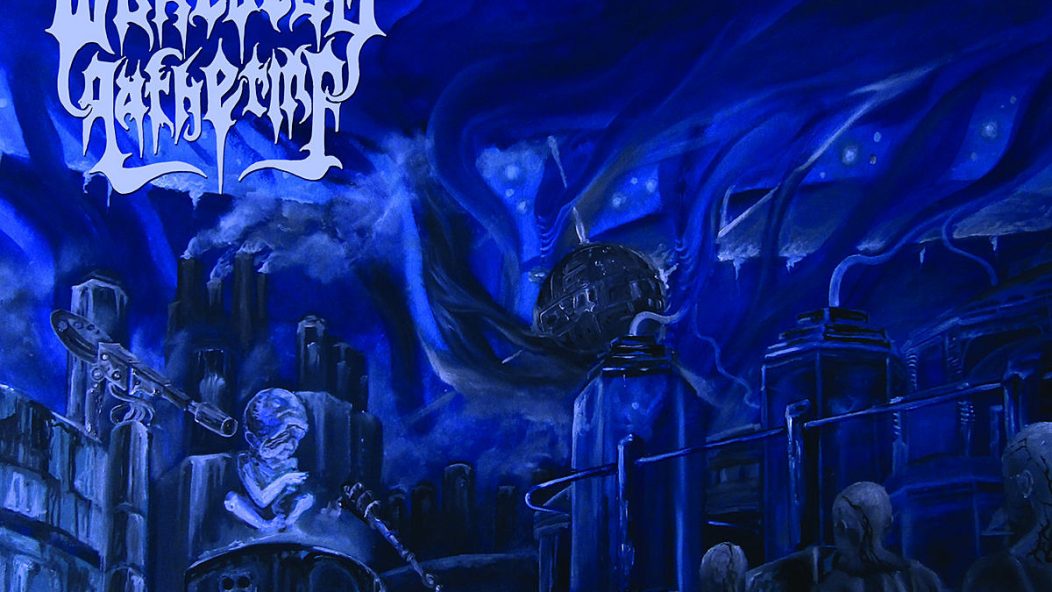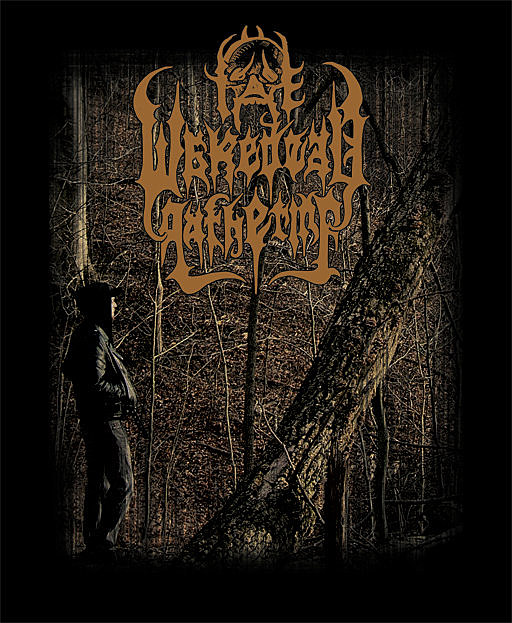
Piercing the Veil #10: The Wakedead Gathering's Futuristic Class Warfare
Piercing the Veil is a column that dives deep into themed bands and albums, exploring what makes their concepts more than just a gimmick.
“Science is not political, it just is. It’s how you use it that determines what happens and its politics,” says The Wakedead Gathering‘s Andrew Lampe, a statement that comes through as a breath of fresh air after the previous two years. It’s well documented how science can become political through weaponization: NERV enforced strict defense protocols through scientific breakthroughs with the Evangelions, and the Forerunners created the Halo rings to prevent a Flood armageddon. These examples represent how art interprets scientific weaponization, using thin allegories to point out the flaws of aggressive implementations. Parallaxiom, the latest album from Ohio’s The Wakedead Gathering, is one such piece of art that examines how ruling classes can mobilize science to suppress have-nots.
The Wakedead Gathering is Andrew Lampe’s death metal solo project, far removed from his main works as Invulation and Echushka. Those two take up the bulk of Lampe’s time, but he was finally able to release Parallaxiom on I, Voidhanger Records this past July after two years of delays. Its tidy sound is a far cry from Invulation’s war metal or Echushkya’s raw and atmospheric black metal. Rather than relying on brute force or grandeur, The Wakedead Gathering prioritizes scalpel-sharp songwriting in which tracks seldomly stick to one tempo for longer than a minute. Parallaxiom continues Lampe’s journey into horror with a science fiction meditation on eugenics; the authoritarian regime in a dystopian future develops the technology to experiment on fetuses, determining their likelihood to break the law later in their life. Those that possess predictory genetics are either jailed or executed. Despite its far-flung future setting, Lampe notes the album’s metaphorical resonance.
…
…
“It’s about systematically making sure that they (lower class people) can never reach beyond their situation. If you were to test someone at birth or before birth and they’re genetically predisposed to be a criminal, the thought could be that we need to dispose of them now, but then you’re just taking that stigma of being from a certain class or status in life and saying that they’ll never grow beyond that, therefore they don’t matter,” says Lampe.
Parallaxiom adopts a surgical tone that reflects the upper class’ detachment from society. The powers that be exile those they deem at risk with as little care as one exiles a cherry’s pit from their mouths. It’s impossible to value an entity that’s considered irredeemable. This is the basis upon which Parallaxiom’s authoritarian state dictates whether or not an individual is worthwhile, and the album’s horror comes from the humanity on both sides of that interaction.
In the case of the authoritarian state, there is no humanity. They act on the pragmatic belief that a potential offender is a stain upon society’s proverbial blouse and discard said transgressor as soon as they get the chance. Conversely, there are those that face persecution for crimes they haven’t yet committed. They are people that they will break the law and are thus unfit for the world. They are deprived of any hospitality, stripped of any autonomy, and dehumanized without a trial.
Lampe intentionally shrouds the state’s process through blunt lyricism. He blurts solitary words, letting their meanings and connections exist in the space between them. For example, “The High Disposition of Biological Court” recounts the process as:
They judge
Unborn
Upon
ConjectureThey fear
Heretics
Unknown
Demeanor
Lampe designs his tracks around architectural tempo changes so his phrasing provides the highest value for meaning relative to word count. It’s Hemingway’s Iceberg Theory operating at its peak. There needn’t be any further details because they’d only muddy the waters of interpretation. Lampe’s point is not that science is harmful, it’s how one applies that science that determines its politicization.
Though the mechanically terse phrases convey how the state executes its goal, they exclude details of the process. Lampe never discloses the severity of the crimes the predisposed will commit, at what age they will, or why they will commit them, because these variables don’t matter to the authoritarian state. All that’s relevant is that someone will act against their interests and therefore must be ousted. Beyond the nuances of this framework, there’s one glaring hole in Parallaxiom‘s undefined legal system: what constitutes a crime? Is murder viewed with the same heft as dodging transit fare or illegally streaming a UFC pay-per-view event? The opacity of these details grants another layer of horror as suddenly the concept of crime itself must be considered. One can assume that there are those who currently rebel against the state, thus, some of these crimes may be political demonstrations, protests, or awareness raising. This is all theoretical, but Lampe welcomes the inquisitions.
“I like to allow the listener to add their own interpretation rather than telling them what it is and why it has to be that way. It makes it, I don’t want to call it interactive, but it’s more open-ended. You can take it how you like,” Lampe explains.
Given the global narrative over the past two years, Lampe wouldn’t be surprised if people noted similarities between Parallaxiom and the COVID-19 pandemic. Slippery slope arguments, personal rights, and debates over society’s greater good are obvious comparisons. However, the pandemic played no role in the record’s conception. Lampe finished recording it in 2018; the only reason why it did not release on its intended date in 2020 was because nothing was released as intended in 2020. In fact, many of the tracks took years to write, with “High Court of Biological Disposition” dating back to 2013.
…

…
On the subject of context, Parallaxiom‘s place in The Wakedead Gathering’s discography is notable for a few reasons. For one, it’s the most optimistic album Lampe has made as a solo artist. It’s an old-school-indebted death metal album that skulks around middle-of-the-road BPMs, pairing Lampe’s riff-writing adoration with intelligently informed tempo changes. Secondly, his improvements as a songwriter are emboldened by the cleaner production compared to 2016’s Fuscus: Strings of the Black Lyre. That record favored a dark fantasy setting and black metal influences, but its production shrouded Lampe’s vocal talents and obfuscated the guitar work. While this approach benefitted Fuscus: Strings of the Black Lyre‘s intent, it wouldn’t fly on Parallaxiom. Lampe therefore uses a revamped production style that, while stripping away his previous album’s atmosphere, emphasizes his vocals and riffs. It better complements Parallaxiom‘s alkaline qualities.
The Wakedead Gathering’s fourth album is not their first foray into sci-fi either. To consistently challenge himself, Lampe bounces between science fiction and traditional horror, which not only flexes his songwriting capabilities, as he believes each subject requires certain approaches, but also allows him to examine different scenarios. Yet, as he says, many of them are horrendous, barring Parallaxiom. His second album The Gate and The Key involves extra-terrestrials transmogrifying astronauts while Fuscus: Strings of the Black Lyre spurts a tale of witches mutating children. Lampe laughingly remarks, “There’s no happy ending for the previous ones [laughs].”
The same cannot be said for Parallaxiom. Buried in its detached eugenics is a story of communal action in the literal form of a violent revolution. “There are all these institutions that just want to control certain types of people and keep people down, and on an individual level you can fight against it, but it takes banding and working together to overthrow that,” says Lampe. It’s important to note that Lampe isn’t advocating violence so much as he is praising empathy, coalitions, and camaraderie. These are basic principles of selflessness that dissolve once the individual is isolated by the state, much like how Parallaxiom‘s authoritarian regime places a crime’s onus onto one’s genetics rather than funneling their resources into building a society that’d encourage harmony, thus dissuading transgressions.
A system like this would work to empower people rather than chastise them for a decision they’ve yet to make. It’s a humanist shift that Lampe pines to witness in the future, marking yet another step away from previous The Wakedead Gathering releases. While they were horrifying in their own right, Parallaxiom etches them out by suggesting a solution. He summarizes the album as, “At the end of the day, I don’t want to see needless suffering. I don’t think a lot of people do. The theme I was going for was, all these horrible things are happening and can happen, but we can get away from that and work towards a world where there’s much less of that happening.” As such, he’s not fearful of people nor science, and instead champions both as a means of re-establishing hope.
…
Parallaxiom released July 15th, 2022 via I, Voidhanger Records.










